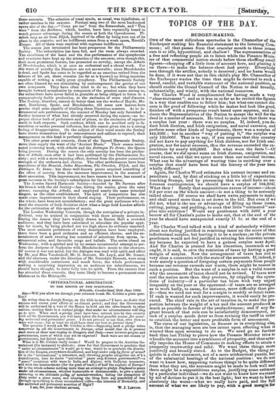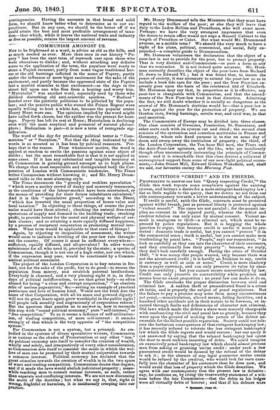TOPICS OF THE DAY.
BUDGET-MAKING.
ONE of the most ridiculous spectacles is the 'Chancellor of the Exchequer making his financial statement to the listening Com- mons ; all that passes from that oracular mouth to those intent ears is so idle, hypocritical, and shallow ! The representatives of a free and reflecting people sit to listen while the Finance Minis- ter of that commercial nation stands before them shuffling small figures—chopping off a little item of account here, and glueing it on there—to make the balance-sheet look pretty. Everybody sees through the artifice nobody is deceived ; and no harm would be done if it were not that in this child's play Mr. Chancellor of the Exchequer wastes the time that might be devoted to such a broad, candid, and veritable statement of the national position, as should enable the Grand Council of the Nation to deal broadly, substantially, and wisely, with the national resources. Sir Charles Wood is complimented for having made a very "clear statement ": and so it was in so far as he recited the figures in a way that enables one to follow him ; but what one cannot din. cern is the good of following while he makes bad look like good, finishes off with a prosperous result based upon supposes, and in- duces the Representatives of the Nation to accept the will for the deed in smatter of accounts. He tried to make out that there was a surplus last year : there was no surplus. If, indeed, you de- duct Irish distress, and Irish emigration, and naval excesses, and perform some other kinds of legerdemain, there was a surplus of 444,329/. • but in another "way of putting it," the surplus was only 120,400/. That is to say, if you suppose that this country did not have to pay anything for Irish distress, nor for Irish emi- gration, nor for naval excesses, then the revenue exceeded the ex- penditure by nearly '450,0001. But what were the facts ?--Of course, that we did spend sums on Irish distress, emigration, and naval excess, and that we spent more than our national income. What can be the advantage of wasting time in smirking over a surplus that would have been had the history of the year been wholly different Again, Sir Charles Wood estimates his current income and ex- penditure; and, by dint of sticking on a little bit of expectation touching Stamps, and by presuming that we shall have no un- foreseen contingencies, we should have a surplus of 104,304/. What then ? Surely that supposititious excess of income—about 0.2 per cent on the whole amount—is not a thing to be seriously talked about. Of course we shall have extra payments to Make, and shall spend more than is set down in the bill. But even if we did not, what is the use or advantage of filling up those items, cutting, paring, and padding, to coax that little "estimated" sur- plus into existence'? Would any gentleman with 5001. a year bestow all Sir Charles's pains to make out, that at the end of the year he should have unexpended exactly 1/. Is. at the end of a year. Sir Charles Wood talked with a kind of melancholy wildness about not feeling' justified in remitting taxes on the score of that infinitesimal surplus, but leaving it to be a nucleus; as the private gentlemen would not feel justified in relaxing his domestic econo- my because he expected to have a guinea surplus next April. And Sir Charles is praised for his discretion, inasmuch as we ought, it is said, to earn the remission of taxes by having a good margin of surplus. Now the arrangement of taxes has not $o very close a connexion with the state of the accounts. If, indeed, it were merely a question of foregoing certain payments from people because our revenue exceeds our wants, there might be reason in such a position. But the want of a surplus is not a valid reason why the assessment of taxes should not be revised. If taxes now cost the nation more than they produce, by crippling the opera- tions of industry—if a particular tax bears with very unjust inequality on the poor or the oppressed—if taxes are so arranged as to work badly, to cause, for instance, more difficulty than pro- fit—then we need not wait for a margin to modify or remit taxes. If cash is wanted for such improvements, it would easily be pro- cured. The chief rule in the art of taxation is, to make the pro- portion between the weight of a tax and the amount produced as much as possible in favour of the productiveness; and if any fla- grant breach of that rule can be satisfactorily demonstrated,. no lack of a surplus needs deter us from revising the tariff in order to establish the better and more profitable form of 'assessment.
The curse of our legislation, in finance as in everything else, is, that the managing men are less intent upon. effecting what is wanted than upon seeming to do so. We need go no further back than last Friday to prove how the Finance Minister tries to wheedle the accounts into a semblance of prosperity, and thus actu- ally impedes the House of Commons in making efforts to attain a prosperity trustworthy and solid. We want these things more positively and broadly stated. As to the Budget, the thing re- quisite is a clear statement, not of a mere arithmetical puzzle, but of the substantial bearings of the national position : we do not want to know how, supposing various things to be quite different from what they are, the accounts might be made to look well and there might be a supposititious surplus, justifying some estimate by a particular individual—we do not want tolnow how we stand by aid of devices to put it in the best light; but we want to know absolutely the worst—what we really have paid, and the full amount of what we are likely to pay, with a gaol margin for contingencies. Having the accounts in that broad and solid form, we should know better what to determine as to our ex- penditure. But in any case, we should be the better off if we could attain the best and most profitable arrangement of taxa- tion—that which, while it leaves the national trade and industry as free as possible, retains the largest amount of revenue.



























 Previous page
Previous page